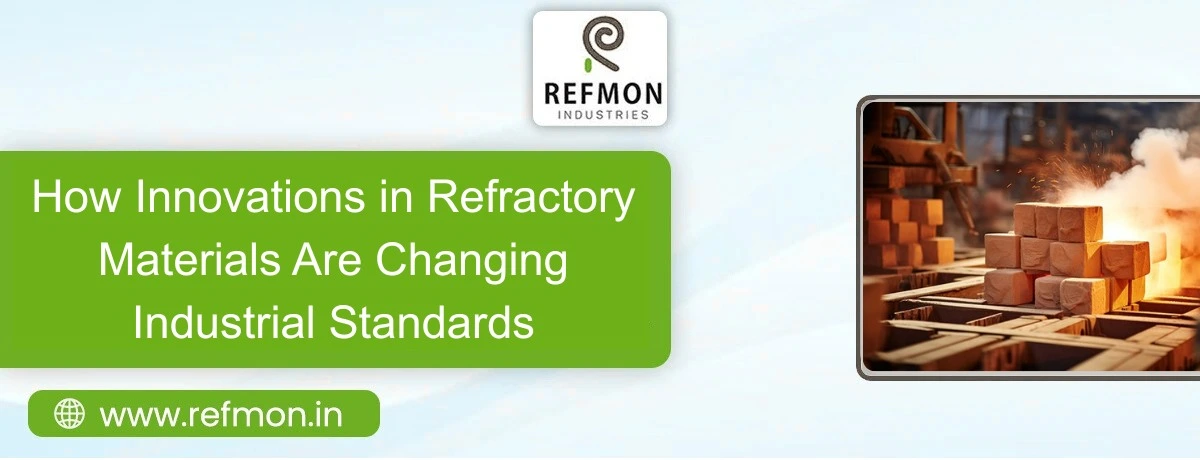
How Innovations in Refractory Materials Are Changing Industrial Standards?
The industries are constantly evolving, and the materials that can withstand the extreme conditions are essential in this change. The development of refractory materials is changing how industries work and making them efficient, durable and safe. New developments with acid-resistant surfaces and thermal insulation are defining new standards of industrial environment and functionality.
How Refractory Material Innovations Are Transforming Industries?
High-performance materials are necessary rather than a luxury in the modern industrial world. One of these refractory materials has become a pillar, since it allows industries to resist the high temperatures, chemical exposure and mechanical stress. Such materials not only protect the equipment but also enhance production efficiency, reduce the cost of maintenance and improve the service life of industrial equipment.
The production of refractory materials in India is also moving to a new level by incorporating modern technologies so as to attain international standards in the production of refractory materials.
Innovative Types of Refractory Materials
1. Acid-Proof Tiles
The use of acid-proof tiles is revolutionising the chemical industry. Acidic substances cannot easily corrode them; hence, safer operations and less wear and tear on equipment. Such tiles are now the standard in industries that work with aggressive chemicals.
2. Glass Wool Board
Glass Wool Board is an excellent lightweight insulating material, and it is easy to install, avoiding heat damage. The use of this innovation in industries is on the rise as industries strive to be energy efficient and have stable temperatures of operation.
3. High-Temperature Refractories
Impact on the new refractory material of high temperatures is also capable of facing the extreme heat levels and long exposure. It has been a great innovation in the steel, cement and glass industry where the conventional material sometimes proves disappointing in terms of expectations.
Industrial Standards
1. Increased Service Life: The materials of refractory are more durable now and this increases longevity reducing downtime and costs.
2. Energy Efficiency: Glass Wool Board and other materials are more insulating and minimize the energy consumed and operational expenses.
3. Safety enhancements: Acid-proof tiles and other chemical-resistant materials enhance workplace safety, thereby providing safer working environments for workers.
4. Environmental Advantages: Advanced refractory materials are typically environmentally friendly and can enhance eco-friendly manufacturing processes.
Refractory Material Manufacturers in India
The refractory material manufacturers in India can create quality materials such as acid-proof tiles and Glass Wool Board to use in the steel, cement, and chemical industries. They can enhance durability, efficiency, and safety, and presumably improve Indian status in the world refractories manufacturing market.
Role of Refractory Material Manufacturers in India
The refractories manufacturing industry is growing at a very high rate, and manufacturers are focusing on research and development. Local firms are also pioneering the development of materials that can be used internationally while serving the needs of regional industries. This entails the formulation of new composites, the enhancement of heat resistance, and the development of customised products that suit various industrial uses.
Challenges Faced by Refractory Material Manufacturers in India
The challenges that may confront the refractory material manufacturers in India despite the rapid growth may include high costs of production, availability of raw materials and maintaining quality standards globally. These problems could need investments in research, technology and talented workforces. By beating these challenges, the refractories manufacturing industry will improve and enhance the status of India in the world market.
The Future of Refractory Materials in India
Due to the fast development of technologies, the future of refractory materials will be able to offer smarter, more durable, and environmentally friendly solutions to industries. Such innovations as improved Glass Wool Board and acidproof tiles can be used to improve the saving of energy and safety.
The expansion of the refractory material producers in India can probably make the country a dominant force in the manufacturing business of refractories across the world.
Conclusion
Refractory material inventions (such as Glass Wool Board and acid-proof tiles) are changing the industrial standards. Through the input of refractory manufacturers in India, the industries will be in a position to secure increased efficiency, durability and safety. The refractories manufacturing sector is poised for further expansion due to the ongoing advancements in technology and innovation.
Frequently Asked Questions (FAQs)
Q1: What are the refractory materials, and what is their purpose?
Refractory materials can withstand high temperatures and chemical reactions, making them essential in the steel, cement, glass, and chemical industries.
Q2: What is the significance of acid-proof tiles?
Industrial equipment can be covered with acid proof tiles to prevent corrosion of equipment caused by chemicals and be safe and cost less to maintain their condition.
Q3: What are the major manufactures of refractory materials in India?
A number of manufacturers of refractory materials in India can offer such a solution as Glass Wool Board and other sophisticated materials to raise the standards on the global industrial scale.
Q4: What are the uses of Glass Wool Boards to industries?
Glass Wool Board can offer high quality thermal insulation to industries, and this avoids wastage of energy, and it keeps temperatures constant, as well as, results in high efficiency.
Q5: What are the changes in the refractories manufacturing business in India?
The refractories manufacturing business in India is also expected to expand at a high rate, and the manufacturers can launch new innovative and high quality materials that can be used in industry of global standards.